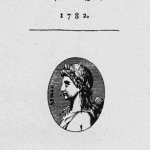Nicolas Roberto Robles
Badajoz, Spain
 |
| Figure 1. Portrait of Friedrich Schiller by Gerhard von Kügelgen. Goethe-Museum. Public Domain. |
Johann Christoph Friedrich von Schiller was born on November 10, 1759 in Marbach, Württemberg, Germany. His father, Johann Caspar Schiller, was a regimental surgeon in the service of Duke Karl Eugen of Württemberg. Schiller (1759–1805) is best known for his immense influence on German literature. In his relatively short life, he authored an extraordinary series of dramas, including The Robbers, Maria Stuart, and the trilogy Wallenstein. He was also a prodigious poet, composing perhaps most famously the “Ode to Joy” featured in the culmination of Beethoven’s Ninth Symphony and enshrined, some two centuries later, in the European Anthem.
Alle menschen werden Brüder
wo dein sanfter pflüge weilt…
All men will become brothers
Where thy gentle wing abides…
F. Schiller. “Ode am die Freude”
It is not well-known that Friedrich Schiller was also a physician. He studied medicine at the High Karlsschule in Stuttgart. Although Schiller entered medicine principally because anything seemed better than law, he confessed to being attracted to the healing art for the intimate contact with people it would provide. He also took comfort in the fact that Albrecht von Haller, one of his preferred writers, had been highly successful as a poet and physician.
In 1779 he passed the first medical exams and asked to be released to become a military doctor. However, this was only granted to him in December 1780. Schiller joined the Grenadier Regiment of Augé in the Ducal Württemberg Army as Regimental Medic (formed in 1767 from the two Grenadier companies of the 5th District Infantry Regiment Württemberg) with Augé as head of the regiment. He was probably dissatisfied with his professional situation right from the start. The regiment’s reputation was not brilliant, since, according to Schiller, it consisted of “240 almost exclusively invalids and cripples.” The comparatively meager wages of the regimental doctor corresponded roughly to that of a first lieutenant and there was a lack of promotion opportunities for troop doctors at the time. Besides, the duke had denied his request to improve his earnings by treating civilians. Other Württemberg military doctors were permitted to run a civil practice on a case-by-case basis, as was the wearing of civilian clothing, which Schiller also requested, but he was forbidden to do both.
 |
| Figure 2. Schiller’s Anthologie (1782). Public Domain. Via Wikimedia. |
In 1780, he obtained a post as a regimental doctor in Stuttgart, a job he disliked. Several years later he wrote about the work of a physician in a Grenadier Battalion: “As much as I understand his work, he must love strong doses in emetics as much as in Aesthetic, and I would rather give him horse hoofs for a cure than my wife.” He was said to be particularly fond of strong emetics and, the only surviving record of his prescriptions is for “3 g. Tartar emeticus dissolved in 4 oz. of hot water.”
To attend the first performance of The Robbers in Mannheim, Schiller left his regiment without permission. As a result, he was arrested, sentenced to fourteen days in prison, and forbidden by Karl Eugen, Duke of Württemberg, from publishing any further works. For the next two years, Schiller thought more about literature than medicine. Forced by poverty to think in terms of a steady income, however, he often wrote to his friends that he was considering a Doctorate in Medicine to become a professor of physiology. He never went through with the plan, although he often signed letters during this period with an M.D. after his name.
Schiller received good grades at the school of medicine except for botany. In 1778 he tied for first prize in anatomy, but the award went by lot to Elwert, his classmate. Schiller was held in high esteem by his teachers at the High Charles School and was a model student of the emerging academy. One interesting record that has survived was that of an autopsy performed by Schiller that year on his young classmate Hiller, who apparently died of tuberculosis. The report is careful and systematic and corresponds well with the report submitted by Professor Reuss, who also examined the case.
His teachers did not accept his first dissertation, the “Philosophy of Physiology.” His second attempt, “De discrimine febrium” about the difference between “inflammatory and putrid fever” was also not successful. They were too speculative, too grand in style, not empirical, and lacked the tone of scientific objectivity.
However, Schiller received an opportunity for a third dissertation attempt. “Versuch über den Zusammenhang der tierischen Natur des Menschen mit seiner geistigen” (Attempt to relate the animal nature of man to his intellect)—as Schiller entitled the third dissertation—aligned with a central focus of the Enlightenment. The Enlightenment asked questions about all aspects of nature, and humanity, such as the instinct of self-preservation and the “animal nature” of humans. Schiller’s dissertation also dealt with human instinctual nature, how “animal nature” exists with “spiritual nature.” Unfortunately, there is not a single thought in Schiller medical writings that contemporary medicine did not have ready. The very topics that Schiller choose for the first and third dissertations are a clear sign that he was not inclined to be a doctor nor a natural scientist. What he was interested in above all was the possibility for exploring the nature of man, what the Enlightenment has called “Allgemeine Menschennatur” (general human nature).
In his final year of school he was asked to report on the melancholic behavior of a fellow student named Johann Friedrich Grammont. His conclusion was: “. . . nothing but a true hypochondriasis, that unhappy condition of a human being in which he is the pitiable sacrifice to the close sympathy between body and soul: that disease of deep-thinking, deep-feeling spirits and of most great scholars.”
 |
| Figure 3. Schiller’s House at Leipzig. Photo by Appaloosa. Via Wikimedia. CC BY-SA 3.0 |
Schiller fled from Stuttgart in September 1782 to begin his career as a dramatist, historian, and poet. There is no evidence that he ever saw a patient professionally after 1782, although his letters throughout the remainder of his life were full of pieces of medical advice and some speculations about physiology.
Nein, eine Grenze hat Tyrannenmacht,
Wenn der Gedrückte nirgends Recht kann finden,
Wenn unerträglich wird die Last – greift er
Hinauf getrosten Muthes in den Himmel,
Und hohlt herunter seine ewgen Rechte,
Die droben hangen unveräuserlich
Und unzerbrechlich wie die Sterne selbst
No, a border has tyrant power,
If the oppressed cannot find a right anywhere,
If the burden becomes unbearable – he reaches
Courage cheerfully up into the sky,
And hollows down his eternal rights,
Those hanging above inalienable
and unbreakable like the stars themselves.
F. Schiller, Wilhelm Tell, II, 2.
NICOLAS ROBERTO ROBLES is a professor of Nephrology at the University of Extremadura, Spain.
Summer 2020 | Sections | Physicians of Note

Leave a Reply